Illinois Baptist

Pastoring to gender fluidity





Springfield | Some Illinois Baptist leaders expressed surprise but are hoping for a godly outcome in a federal investigation of the Southern Baptist Convention’s handling of sexual abuse claims.
“It caught me by surprise,” said Adron Robinson, an Illinois representative on the SBC Executive Committee (EC), while also urging prayer for justice. IBSA Executive Director Nate Adams said further exploration by the U.S. Department of Justice (DOJ) seemed to be a natural next step.
But observers outside the SBC and representatives of abuse survivors question whether the extensive report on abuse claims produced by Guidepost Solutions at the direction of the SBC’s Sexual Abuse Task Force (SATF) uncovered only the “tip of the iceberg.”




The DOJ probe was revealed in a statement by the EC on Aug. 12.
The EC confirmed it had received a subpoena from the Justice Department and was complying with the request for documents. The statement was signed by the heads of the EC, the Ethics and Religious Liberty Commission (ERLC), six Southern Baptist seminaries, two mission boards, Lifeway Christian Resources, and the Woman’s Missionary Union, which is an auxiliary—eleven entities in all. The leaders all pledged cooperation in the investigation, but apparently none have been contacted yet.
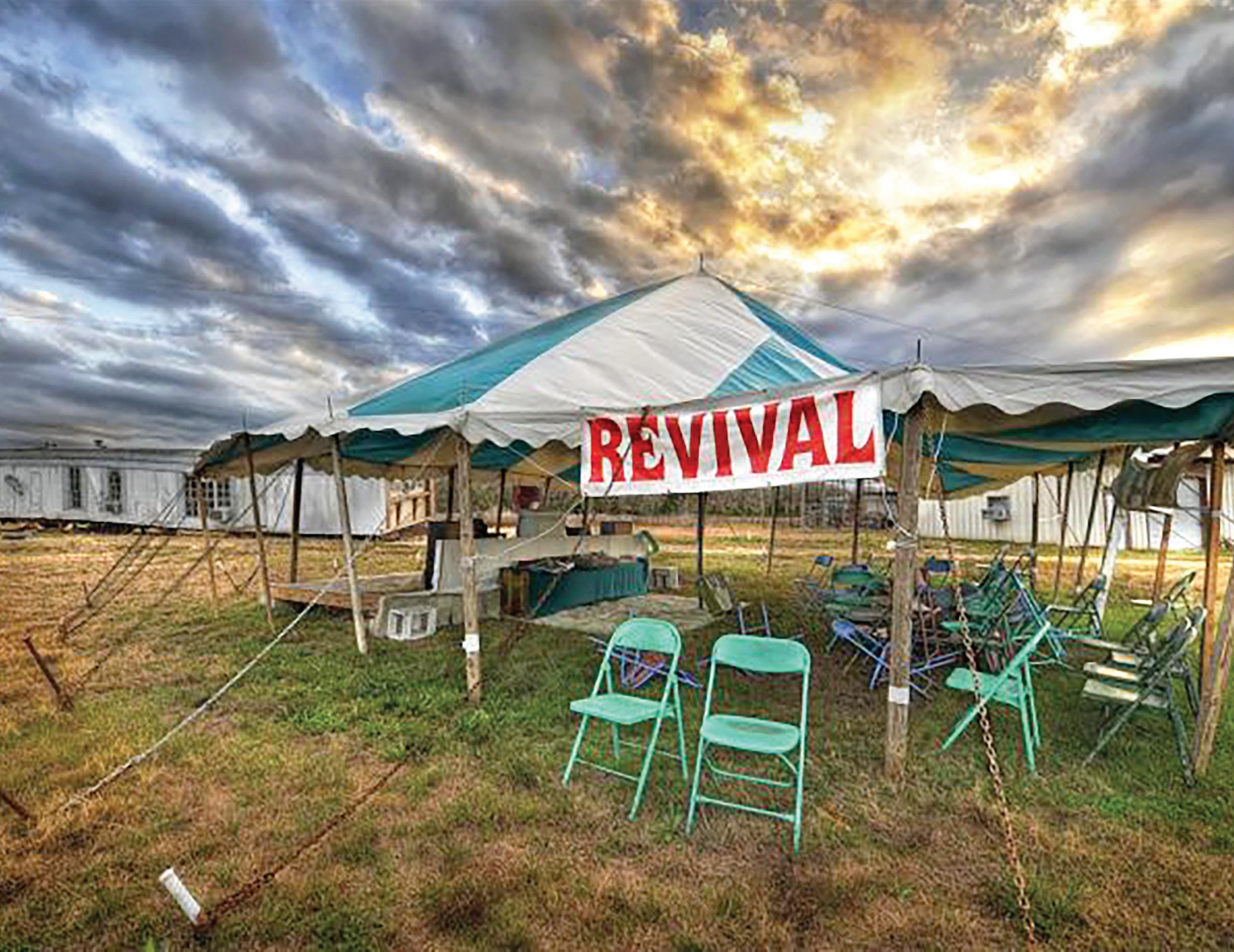
The Department of Justice would not confirm the SBC statement. “While we are aware that the SBC has made certain confirmations about this matter, the U.S. Attorney’s Office does not confirm or deny the existence of an investigation,” David Boling, a spokesperson for the U.S. Attorney’s Office for the Middle District
While

Editor - Eric Reed
Graphic Designer - Kris Kell
Contributing Editor - Lisa Misner
Copy Editor - Leah Honnen
Team Leader - Ben Jones
The general telephone number for IBSA is (217) 786-2600. For questions about subscriptions, articles, or upcoming events, contact the Illinois Baptist at (217) 391-3127 or IllinoisBaptist@IBSA.org
The Illinois Baptist is seeking news from IBSA churches. E-mail us at IllinoisBaptist@IBSA.org to tell us about special events and new ministry staff.

POSTMASTER: The Illinois Baptist is owned and published every month by the Illinois Baptist State Association, 3085 Stevenson Drive, Springfield, Illinois 62703-4440. Subscriptions are free to Illinois Baptists. Subscribe online at IBSA.org.
Michael Campo is planting pastor for Living Word Bible Church in Lemont near Chicago. The Campos began sharing Christ with family and friends, resulting in three baptisms in four months. Michael says he is most excited about the unity of purpose in their 22 regular worship attenders.

The Butter Cow at the 2022 Illinois State Fair munched on a sunflower, a reminder of the people of Ukraine. Pray for those still in the war-torn country, refugees in neighboring countries, and SBC missionaries ministering to them.

(See related story on page 11.)
Longtime medical missionaries Doug and Cheryl Derbyshire work at the Bangkla Baptist Clinic in Thailand. Doug (above, left with a patient) says medical care is “a remarkable bridge” to the gospel. The Derbyshires hold mobile clinics across the country, opening doors in places where there are no Christians.

Giving by IBSA churches as of 07/15/22 $3,432,859
Budget Goal: $3,934,623
Received to date in 2021: $3,646,799
2022Goal: $6.2 Million
NATE ADAMSFor Southern Baptists, doing international missions often means sending and then partnering with a missionary in a place where there are few or no known Christians. Many times, they are solitary witnesses among thousands of people who have never heard the gospel, and who probably don’t have a Bible in their own language.

North American missions is primarily about church planting, and the evangelism and community ministries that invite seekers and new believers into that new church. Church planting missionaries focus on communities where there isn’t a church, or on groups of people who aren’t being reached because of language, demographic, or culture. Yet it can still require years of faith and hard work before a lasting church is established.
Missions within a state like Illinois can have elements of both international missions and North American missions. Especially in larger cities, but increasingly throughout the state, there are pockets of unreached people groups from all over the world. And last year Illinois church planters started 13 new churches here, with a total of about 60 new churches in their early years of development. Yet there are still 10 counties with no SBC church, 13 with only one, and there are now more Muslims in Illinois than Southern Baptists.
One unique thing about state missions, however, is who the primary missionaries are. Here in Illinois, our IBSA staff recognizes that it is not us but our IBSA churches who must be the primary missionaries. Our most strategic role is to invest our lives in the health, growth, and missionary calling of each church, so that it can more effectively turn itself inside out into the lostness of its community.
With almost 13 million people, Illinois has a population larger than 131 of the world’s 209 nations. Yet there are only about 20 traveling ministry staff at IBSA, and about 35 overall. It is not our handful of staff but our 900-plus churches that can have the greatest impact on the vast lostness of our state mission field!
That’s why “Each Church a Missionary” is the theme of this year’s Mission Illinois Offering. Most churches receive this offering during September, and anyone can give directly through the IBSA website at IBSA. org. At missionillinois.org there are video stories of churches being a missionary in small towns, medium-sized cities, and Chicagoland, and of churches being started, restarted, and revitalized.
Certainly each church is a missionary, but I don’t want to understate the roles that our IBSA network staff play in assisting and delivering value to those missionary churches. In addition to helping plant 13 churches and providing ongoing support to 60 newly developing churches, last year our IBSA staff helped train more than 600 pastors and 5,000 leaders. The staff your church supports through the MIO are now working with over 50 churches on intentional revitalization processes, and over 100 churches in “Next Step” consulting. IBSA camps have already hosted more than 3,000 participants this year, and thus far more than 80 children and students have come to faith in Christ.
The Mission Illinois Offering is especially important this year because ongoing Cooperative Program giving has currently returned to mid-pandemic levels, probably due to inflationary pressures on giving to churches and perhaps other concerns. As we now enter these final months of the year, we are hopeful that many churches will be able to provide a generous offering that focuses on our shared mission field here in Illinois. CP is shared with all the missions and ministries of the national SBC, but 100% of the MIO supports the missionary work of churches right here in Illinois.
Nate Adams is executive director of the Illinois Baptist State Association. Respond at IllinoisBaptist@IBSA.org.

Hannibal, Mo. | Students moved into their dorm rooms at summer’s end and classes resumed Aug. 22 at Hannibal-LaGrange University after a season when the viability of a fall semester was in question.

The school was in crisis mode in March, with closure predicted before the end of the spring semester unless immediate cuts were made and funds raised. The school needed to raise or save $2.2 million.
The 94-year-old school was “facing a financial Goliath,” transitional president Rodney Harrison said in a statement Aug. 1. “The president of ten years had resigned two months earlier, and the full reality of the University’s fragile financial situation was still coming to light.”
The executive team cut staff and benefits, trimmed some of HLGU’s 30 majors, appealed to donors, and called on volunteers from local churches to help on campus with lawn care and similar upkeep.
Faculty contracts were cancelled in the exigency plan, with about 15% of faculty dismissed or reduced to part-time status. Of 12 intercollegiate varsity sports, the Trojans’ golf and wrestling programs were eliminated. The school raised $1.5 million. By the end of July, Harrison declared the crisis averted.
“The pay and benefit cuts that had been in place since March would be lifted for all returning employees,” Harrison said. “With a business model in place based on scalability, and a balanced budget based on enrollment realities, HLGU may well become a
model for small liberal arts universities.”



At the start of the new academic year, Inside Higher Ed reported a dozen faculty would not return. Enrollment, which dipped to 780 in 2021, had begun to inch upward, and the student retention rate bumped up from 50% to 60% last year.
In July HLGU began advertising for a few replacement positions.
At the same time, the presidential search team was digging into their pile of resumes.
“We covet your prayers as we begin this search process,” trustee chair Mark Anderson said. “Our greatest desire is to find the person the Lord has to lead HLGU in the years to come. God has been faithful to bring us to this point and we believe he will continue to be faithful in this search process.
“I want to express my deepest gratitude for your commitment to the University,” Anderson wrote to supporters. “These have been difficult days, but we believe with confidence that God is at work at HLGU.”
HLGU was founded in 1928 from the merger of two colleges named for the Mississippi River towns where they were located. The school had a peak enrollment of about 1,200 in 2012. Anthony Allen, who resigned in January, was the school’s 17th president, serving ten years. Harrison is serving as transitional president while simultaneously holding his position as head of Baptist Homes & Healthcare Ministries in Missouri.
Enter the northwest doors of Pennsylvania Avenue Baptist Church in Urbana on a Sunday morning and you will encounter East Asia. River of Life is a Chinese congregation started in 2018 that meets in PABC’s building. Their mission is to share the gospel with Chinese students and immigrants who call Champaign-Urbana home.

The church exists because of the partnership of Illinois Baptists. And their story is one of four featured in the Mission Illinois Offering and Week of Prayer, observed in many IBSA churches Sept. 11-18.

The University of Illinois is home to over 10,000 students from China. While Christianity saw a period of rapid growth in China, it is still rare to be a Chinese Christian. Most students have little knowledge of Jesus when they arrive on campus at U of I.

Thomas Li understands their experience. He was a self-described “strong atheist” when he arrived at Indiana State University in 1997 for Ph.D. studies. But God had other plans. “God was working in my heart, so that gave me the opportunity, but he humbled my heart, humbled me, so I was able to know him,” Li said.
“God put a burden on my heart to do the most valuable thing, that was to save the soul.” That led Li to seminary, then ultimately, to Champaign and its enormous population of Chinese students.
PABC has a long history of outreach to Chinese students, and through help and funding from IBSA and the North American Mission Board, River of Life Church was born. Pastor Li and his family have established roots here. They, along with a small core of committed leaders, are ready to share Christ with the new wave of students who arrive on campus each fall.
Learn more about their ministry at MissionIllinois. org. And encourage your church to pray and support state missions in the month of September.
Springfield | The nine members of the successor to the SBC’s Sexual Abuse Task Force were named by new convention president Bart Barber of Texas after one month on the job. At the same time the list was made public, the South Carolina pastor who will lead implementation of abuse prevention reforms was advising local association leaders in Illinois about the critical importance of moving ahead.
Marshall Blalock co-chaired the SBC Sexual Abuse Task Force (SATF) that presented its groundbreaking report on abuse in the convention’s churches. Five reforms including a task force to lead implementation were accepted by messengers to the Southern Baptist Convention Annual Meeting in Anaheim in June. Blalock accepted Barber’s invitation to chair the new Abuse Response Implementation Task Force (ARITF) in July.
“The purpose of this task force is to assist the churches of the Southern Baptist Convention in our efforts to shut the doors of our churches to those who would act as sexual predators,” Barber said, “and to wrap our arms around survivors and those who love them.”
The ARITF will develop an abuse reporting and offender tracking system. The task force will also have a policing role. They will consult with the SBC Credentials Committee to accept complaints of churches’ non-cooperation due to sexual abuse. Together with the SBC Executive Committee and Credentials Committee, they will select an independent firm to investigate such complaints. The
Continued from page 1
of Tennessee, said in a statement quoted by the Tennessean newspaper. “Also, grand jury matters are secret and we do not comment on whether or not a case may be before the grand jury,” Boling added.
In other words, no one can say for certain how deep the investigation will go or how long it will last. A DOJ investigation of the Catholic Church in Pennsylvania begun in 2018 produced one arrest in 2020 and is still ongoing.
The U.S. Attorney’s Office for Southern New York is also involved in the SBC investigation. Guidepost Solutions, which documented abuse claims in its 288-page report released in May, is based in New York.
That report may serve as a resource for the federal investigation, said Boz Tchividjian, an attorney for abuse survivors, but “they just touched the tip of the iceberg and then they stopped.” He told the Tennessean, “It’s so systemic and so prevalent and I’m hoping that this process with the DOJ will maybe give a greater voice to many of the survivors.”
Tchividjian is founder of GRACE, a ministry addressing abuse, a former prosecutor in Florida, and grandson of Billy Graham.
“I hope people measure their expectations,” he said. “I think it’s a good thing that they (the SBC) are being subjected to the civil authorities... But we just don’t know.”
Hope and prayer in Illinois
EC staff met with trustees and state convention leaders in separate online sessions to explain the
ARITF will report back to the 2023 annual meeting on their selection.
Blalock was the featured speaker at the Associational Mission Strategists roundtable hosted by IBSA Aug. 1-2. Training is vital, he advised.
“Very few folks are trained in how to talk to a sexually abused person,” he said to the leaders. “Having trauma-trained counselors who can help you is important.”
One local association leader present at the meeting was Kevin Carrothers of Salem South Baptist Association. In June he completed three years on the executive leadership team of the Southern Baptist Conference of Associational Leaders (SBCAL) and one year as president.

“Church life in general tends to be a slow process,” Carrothers acknowledged. “Churches need to take everything and evaluate it. We ask, ‘Do we have the financial resources; if not, how are we going to address that?’”
But the local association can be a vital partner helping both pastors and the state convention with implementation. “For example, how are we going to get the sexual abuse assessment (currently in development) to the local level?” Carrothers said.
Blalock briefly discussed the new national SBC
statement and the EC’s compliance with the DOJ subpoena, but little else was made public. Of the eleven SBC entities and the auxiliary, all told our reporting partners at The Baptist Paper they have not received any subpoenas at this time.
“It’s not surprising to me that the Department of Justice is performing this investigation, given the transparent disclosure of so much information through the SBC’s own self-study earlier this year,” IBSA’s Adams said. “Anyone to whom sexual abuse is reported carries a responsibility to the victim and to justice and prevention. This responsibility to protect and care for the vulnerable comes not just from the government but from God’s word.”
EC trustee Robinson from Country Club Hills offered a hopeful response.
The first-ever federal investigation of the SBC may have surprised Robinson, “but after wrestling with it, my pastoral response is just to trust God.” He pointed to the fiery trials forecast in 1 Peter 4:12. “I trust this is just another way for God to reveal his glory, and as a believer, I’m definitely not afraid of someone finding out the truth.”
In contrast to Tchividjian’s view, Robinson said Guidepost did a very thorough investigation and “dug up everything they could.” He does not expect new revelations. While urging patience, Robinson expressed hope that the investigation will not be prolonged.

“Pray for wisdom for all our entity heads and leaders” who may be involved with a probe, the Illinois pastor said, “and pray for justice to be done. God is a God of justice and righteousness.”
Meanwhile, Robinson, who is chairing the EC presidential search team, said he has received no negative response from any candidates who have
Ministry Check database that will be created to track offenders. The ARITF will report back to the Convention on the feasibility, effectiveness, and costs of the website, which will be established and maintained by an independent contractor chosen by the task force.
Once the database is in place, ideally “someone won’t get convicted in Georgia and move to Illinois without people knowing.” However, participation by churches will be voluntary. Blalock is “hoping churches will care enough about their sister churches” to participate.
Blalock again pointed to the importance of screening checks, which admittedly still meet with some resistance in local churches, nearly two decades after they were advocated. In addition to background checks, Blalock said before a person can volunteer at his church, he or she must be known by the church for at least six months. Even then, volunteers are required to provide references and sit for interviews. For the safety of your children and grandchildren he said, “You need to go as far back as you can.”
Blalock cited the statistic that one-fourth of women and one-sixth of men in SBC congregations are survivors of sexual abuse. “Ministry to broken men and women is never a distraction,” he said. “If we began to be known as a church involved in ministry to the abused, we would be blessed. There’s an opportunity to bring the gospel.”
expressed interest in leading the denomination’s central operations hub. Actions by previous EC leaders including former President and CEO Ronnie Floyd and Attorney August Boto were the subject of much of Guidepost’s report.
The search team received resumés through Aug. 26 to replace Floyd, who resigned in October as the Guidepost investigation was contracted.
On the homefront
The federal investigation does not extend to state conventions.
In Illinois, IBSA continues examining its abuse reporting policies and ministry to abuse survivors. An Illinois task force was established by Adams prior to the release of recommendations by the SATF in June.
“I know our network is becoming even more vigilant and comprehensive in its efforts to equip churches in this area, and to protect both vulnerable people and underprepared churches from sexual predators,” Adams said. “We are also learning more about what it means to respond to victims with heightened sensitivity and meaningful help.”
In five recommendations adopted by messengers at the 2022 SBC Annual Meeting in Anaheim, the SATF urged development of trauma-informed counselors for victims and churches. IBSA has identified several such counselors in the state in its abuse ministry plan which is in development.
“There is still much to do,” Adams said, “but I believe churches and church networks are awakening to the magnitude of the need, especially in today’s culture, and are committed to doing whatever it takes to ensure the safety of all.”
Nashville, Tenn. | The September trustees meeting of the SBC’s Ethics and Religious Liberty Commission may be a little longer than usual, as the board prepares to hear from the search team that will recommend the next president.

The group is working through the process with an active candidate, its chairman reported in late July, according to chair Todd Howard of Pine Bluff, Ark. The selection process had narrowed down to three candidates in February. Factors such as the desire for a strong consensus among search team members brought the focus to the current candidate.
The group decided to hold off on discussions this spring in anticipation of the Guidepost Solutions report released in May and the Sexual Abuse Task Force report, which was delivered in June at the 2022 SBC Annual Meeting in Anaheim, Calif. Whenever the search team reaches a strong consensus, they will present that candidate to the ERLC’s board for a vote.
In recent years the ERLC has met with sustained criticism and calls for it to be defunded, including at the 2022 Annual Meeting in June, though Southern Baptists have voted by substantial margins several times to continue supporting the entity. A task force commissioned by the Executive Committee to study the ERLC’s impact on Cooperative Program giving was released in February 2021. Discussion at that month’s EC meeting resulted in no vote taken on the report.
Baptist Press asked Howard if the criticism had affected the search team’s progress.
“It’s definitely had an impact and made it a little more difficult because some who would otherwise aspire to this position understand the tenuous nature of the Commission itself,” he said. “There is probably a bit of hesitancy if they have a more secure job and see we’re voting on [the ERLC’s] viability every June.
“It’s made our job more challenging, for sure. Anyone with common sense can see that.”
If doors close regarding the current candidate, Howard said, the group will consider re-opening the portal for new names
to be considered.
ERLC staffer Brent Leatherwood is serving as Acting President. He spoke on behalf of the ERLC at the SBC Annual Meeting for the second consecutive time, following the resignation of Russell Moore in 2021. Leatherwood deflected comments by messengers and proposed amendments which would have strengthened an all-ornone stance on abortion that would have prevented an incremental approach such as “heartbeat” bills to reduce availability in states where abortion is still legal, including Illinois.
Leatherwood also spoke in opposition to legal punishment for women who have abortions. “You’re not going to get me to say we should put mothers behind bars,” Leatherwood said off script in response to the view that women who have abortions should be treated as murderers.
In Leatherwood’s year, the ERLC has focused on pro-life issues and placement of sonogram machines in crisis pregnancy centers through its Psalm 139 Project, and less on national politics and issues such as immigration that distanced Moore from a substantial number of leading pastors. ERLC has maintained its work on the Caring Well Initiative to prevent and minister after sexual abuse. Unclear at this time is the future of a multimillion-dollar proposal related to abuse prevention that could have involved Guidepost Solutions. The SBC’s relationship with that investigating group was ended after their 288-page report was delivered, and after objections to Guidepost Solutions’ public support of gay Pride Month.
Sources tell the Illinois Baptist that the Sept. 11-14 meeting schedule means trustees may have more to handle than they usually do, although no indication has been made that the search team will be ready to present a candidate.
Howard asked that Southern Baptists continue to pray for the seven-member search team as they continue the process. “This is something God’s got to do,” he said. “He does the heavy lifting; we’re just trying to follow his will.”
Lifeway staffer also takes new role
Carol Stream | Two appointments at publisher Christianity Today (CT) may signal an important shift in what has been a leading evangelical voice. And while one name is well known, the second, lesser known, may bring Southern Baptist sensibilities to daily operations.
Russell Moore was named editor-in-chief starting Sept 1. The former head of the SBC’s Ethics and Religious Liberty Commission became Public Theologian at CT last May when he resigned after unresolved friction with SBC leaders over sexual abuse and his unpopular political stances. Now, as editorin-chief, Moore will provide editorial direction for the flagship publication founded by Billy Graham in 1956.

“Moore has demonstrated, time and again, the courage to express his convictions and the integrity to live by them,” said CT President and CEO Timothy Dalrymple. “Sometimes this has meant contending for essential biblical and theological truths in the public square. Sometimes it has meant declaring truths to the church that challenge and convict us.”
Dalrymple assumed his post in 2019. He holds degrees from Stanford, Princeton, and Harvard. He succeeded Harold Smith, a 30-year CT employee who was CEO for a decade, and Harold Myra who was the guiding force for the evangelical publisher for almost three decades.
Dalrymple also announced the hiring of Joy Allmond as editorial chief-of-staff. Allmond comes from five years at the SBC’s Lifeway Christian Resources, where she was responsible for alignment of Lifeway publishing content with its corporate strategies, and developing plans for President Ben Mandrell to connect with church leaders.

When he resigned from the ERLC, Moore left his SBC church membership for a non-denominational church role in Nashville, but Allmond’s recent history as a Southern Baptist is noteworthy. Christianity Today International, based in metro Chicago, had a history of Southern Baptists in its ranks. With retirements in top management in recent years, however, and controversial comments about the Trump administration under the leadership of its previous editor, some conservative observers had expressed concern about mission drift at CT.
Churches wishing to apply for affiliation with the Illinois Baptist State Association must submit an application for membership by September 20. To request an affiliation packet, visit www.IBSA.org/membership. For more information, contact Barb Troeger at (217) 391-3107 or email BarbTroeger@IBSA.org.

Shiloh | A wide green line on a map of East St. Louis encircles most of the town. It’s the flood zone hit by the same storm system that flooded St. Louis on the other side of the Mississippi River and inundated seven counties in Kentucky in late July. The record floods in Kentucky killed 38 people, and Missouri flash floods broke a 100-year-old record. While news of those stories filled screens and pages, the damage in East St. Louis was largely unreported.
Except to Illinois Baptist Disaster Relief.
Missouri and Kentucky Baptists began digging out in their states, and Illinois teams headed to Metro East to set up an Incident Command Center, handle childcare for residents engaged in filing for assistance, begin assessing damage to homes, and scheduling work teams.
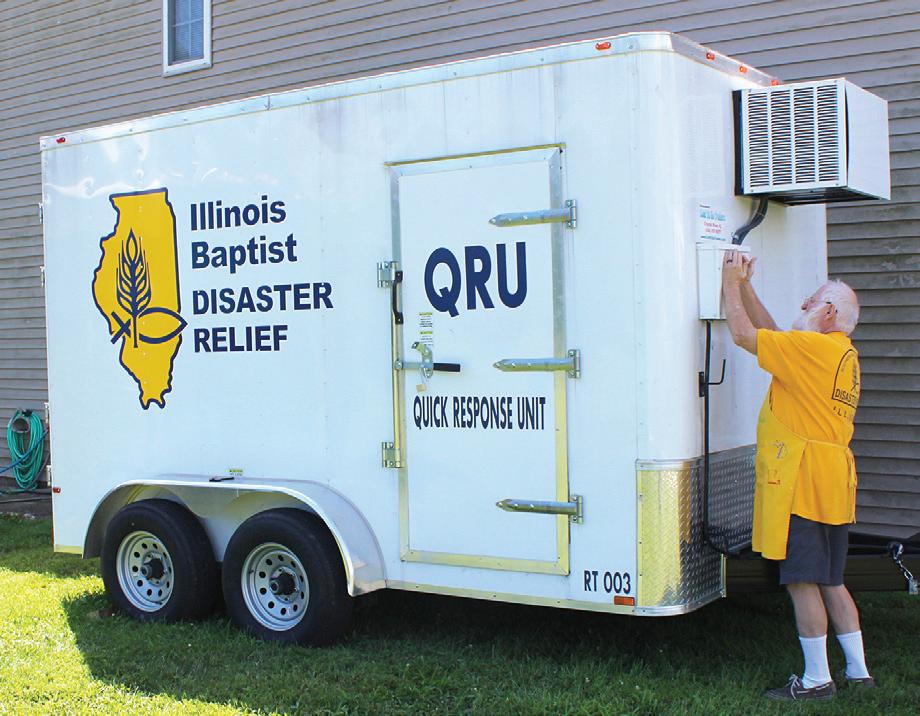
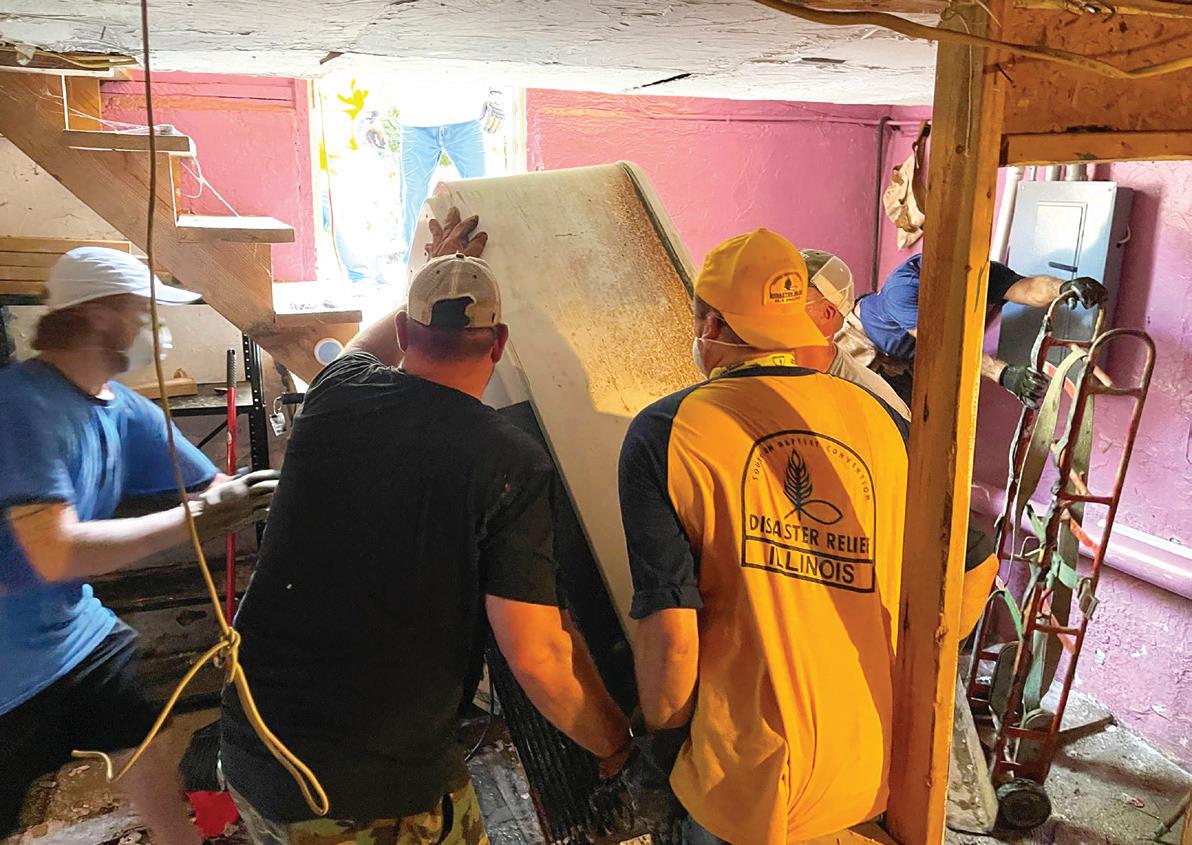
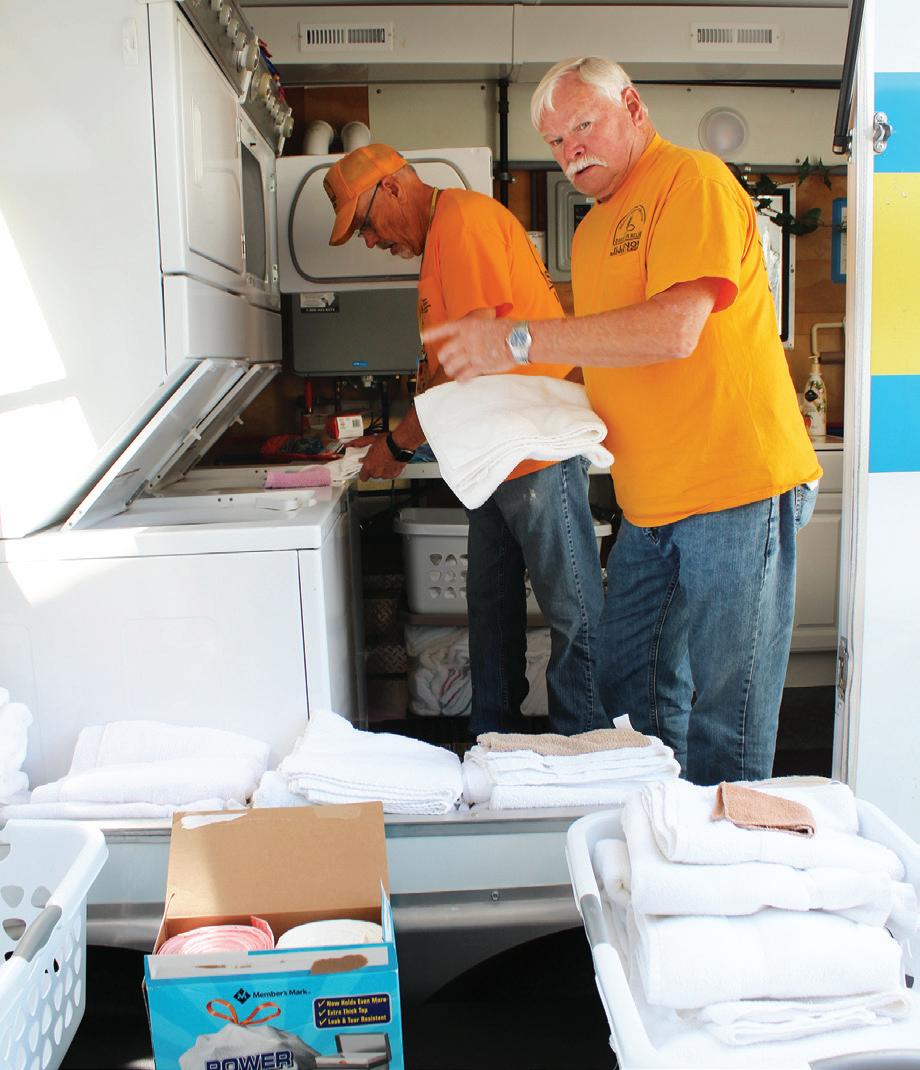

Within a week, 190 requests for assistance had been filed with IBDR.
“We hope to be finished by the end of August,” IBDR assistant state director Harold Booze said midway through the project.
Incident Command was established at Spring Valley Baptist Church in nearby Shiloh, with the shower and laundry unit from Macoupin Association and the kitchen unit from Williamson Association. Also on site was a new freezer trailer, part of a Quick Response team. Booze reported work teams coming from Michigan and Colorado, and partners from American Baptist, Lutheran, and United Methodist Disaster Relief teams were expected to assist.
Among their first projects was clearing the flooded basement of a woman known in the community for feeding homeless people.
“She was having a hard time letting go of things,” Booze said. “It’s understandable, if you’ve lived in a house since 1965.
“My first experience at flood recovery was very emotional for me,” he said. “You’re removing trees and cutting limbs, but then you’re inside someone’s home, often helping them sort and haul out
their belongings. Then you’re tearing out walls, down to the studs. It’s emotional for the homeowner, but it was also for me,” Booze said, recalling his early DR experiences.
Booze is one of three assistant state directors, along with Dennis Felix and John Lindeman. Butch Porter recently retired as state DR director.
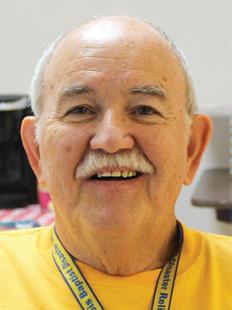
On this callout, more than 1,200 contacts were reported as assessors went house-by-house responding to requests for help. “People have no idea how many lives are touched,” Booze said. Chaplains assigned to the work crews meet with flood victims, giving them time to vent and cry and to ask spiritual questions.
“The teams pray for the homeowners when they finish at a site and give them a Bible signed by the whole team,” Booze said. He found people in East St. Louis especially receptive to prayer. “Here, residents are asking to pray for us!” he said with some amazement.
The kitchen to feed multiple work teams was set up at Spring Valley Church. “I can’t underestimate the importance of having a sister church open their doors and host DR,” the director said.
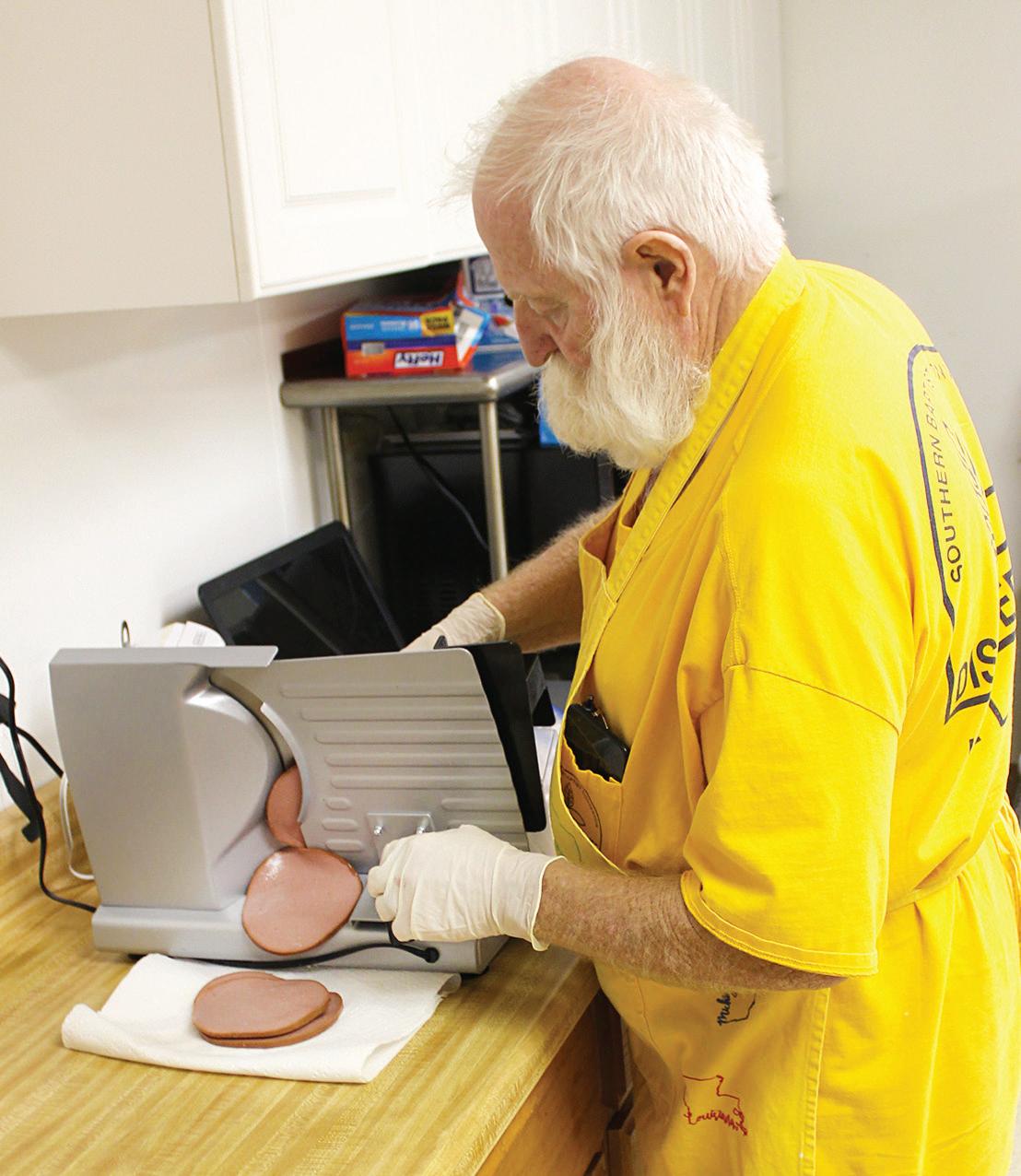
“It may be inconvenient for them—having DR take over the facilities and crews sleeping in classrooms. But it’s a blessing when they do.”
The team fed work crews hot breakfast at the church, packed sandwiches for lunch on the work sites, and served a hot meal for dinner. A new Quick Response feeding unit is on order. The 12-foot trailer will be capable of serving 400 meals at a time using three volunteers. The unit will be housed at Dorrisville Baptist Church in Harrisburg.
Atent erected for a couple of weeks each year out on the edge of town became the center for personal spiritual renewal and evangelistic zeal for a century or more. Traveling evangelists would ignite dry-wood believers and leave fiery faithful in their places to continue their work in the local church for another season.
But in post-war America, the tents were packed away and revivals moved inside, until they disappeared almost completely. Without a phalanx of itinerant evangelists, invigorating the faithful for personal evangelism falls to the local pastor.

On top of this, there’s the declining culture in which we live and work today, and what some theologians are calling a period of deconstruction. Some people are systematically taking apart their faith and deciding what to keep. This is especially true among younger people, in urban areas, and among mainline adherents.
This phenomenon was first named in 1965. In its most complicated form, deconstruction questions every belief, including those unrelated to faith, saying that all beliefs are secondhand and must be deconstructed before they can be owned. It arose from the 60s seedbed of distrust in business, government, media, and, yes, religion.
More recently, the absence from church caused by Covid closures not only broke good habits, it caused some people to seriously doubt their faith. Among 1,000 pastors surveyed by Lifeway Research, 3-in-4 have heard of deconstruction; in the Midwest the number is 9-in-10; but only 1-in-4 say they have seen it in their own churches.
This is the environment in which we live and move and share our faith.
The American culture that accelerated its dismissal of Christian belief around 2000 is now taking the faith foundation apart brick by
Tent revival
From the brush arbor to tent meetings to Midwestern tabernacles, the spring and fall revivals were staples of church life, drawing believers to deeper commitment and lost people to salvation. Today they’ve almost disappeared. Is there a modern-day equivalent?
brick. Coming to the place of personal ownership of one’s beliefs is a good thing. It’s common for teens and young adults to go through a period of distinguishing between their parents’ faith and their own. But the phenomenon that asks “Is anything worth believing?” looks different when it’s engaged by people in their 30s. Or 60s.
So is the outcome. As Millennial writer Joe Terrell says, deconstruction without reconstruction is a tragedy.
Now arises a new debate over the role of the altar call and the timing of baptism. How public is one, how immediate the other? These may be framed as contemporary expressions of the discussion on “revival vs. revivalism” that says inward renewal is good but emotional commitments may not be lasting—or good for the church long-term.
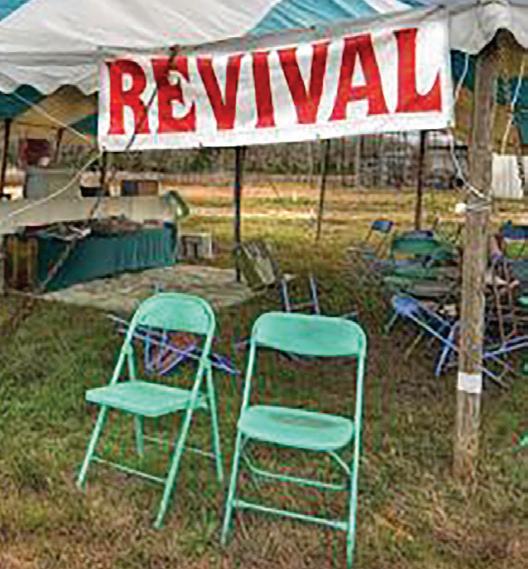
And there is this pertinent question: Will the church be sufficiently revived in our time to awaken our decaying culture to the life-giving claims and call of Christ?
IBSA Evangelism Director Scott Harris is leading Ignite: the Illinois Baptist Evangelism Conference with two-day sessions in three locations this month. Editor Eric Reed asked Harris what the old practices and new developments mean for evangelism through the local church.
Illinois Baptist: The Ignite Conference has expanded this year. What is your goal?
Scott Harris: At the heart of our Ignite Conferences is the desire to see God start a Holy Spiritdirected gospel movement that sweeps across our state.
One focus is equipping young people to share their faith with a training called “The Four.” It’s a simple gospel presentation based on four statements: God created you. God loves you. We’re separated from him because of our sin. Jesus came to solve our sin problem. What do you want to do with this information?
The Four is from CRU, the ministry of Campus Crusade for Christ. IBSA has partnered with them and they’ve allowed us access to their training materials. This is a six-week course. Really it does a great job of training students in spiritual preparation for sharing the gospel.
If we’re gonna turn the trajectory in our state, we have to start reaching the younger generation. When you look at the great revivals, God always worked through the younger folks.
IB: Your second focus in the conferences is prayer. Why prayer rather than technique?
Harris: Yes. We’re not gonna see a great movement of God until our people really start to pray for God’s power, for God’s anointing, but also for divine opportunities to share their faith.

If we’re not praying for people who are lost, we’re probably never gonna share with them. In the process of praying, God changes us. God gives us a passion for that person and breaks our heart over that lostness.
We want to encourage our pastors to make time in their worship services to call the church to prayer for lost people in their sphere of influence. We’re starting to see that happen in some pockets across our country, where churches have made that kind of prayer an ongoing weekly part of their service. Those churches are starting to see signs of revival.
IB: What does this look like in a worship service?
Harris: One thing pastors can easily do on a Sunday morning is in a three-to-five minute prayer time—leading people to pray.
A Texas pastor told at a conference how he was moved by the example of Robby Gallaty. He was under such conviction that some mornings he would lay prostrate on the platform. He could no longer just kneel. He was giving 20 minutes to prayer for lostness.
And one pastor said, “Well, man, I bet that’ll kill a service. You know, you’ll lose people.” But just the opposite.
At the church my son attends in North Georgia, the pastor began praying for lost people in the service. I was there one Sunday and got to witness this. The pastor said, “If you’re able, would you make your seat an altar?”
Probably 800 people simultaneously got up out of their seats, turned around to kneel, and started
praying. You could just feel the place filling up with the Spirit of God. And they are baptizing people every Sunday, many more than before.
IB: How important is it for pastors to see this?
Harris: Oh, I think it’s very important. We need to hear the stories of guys who struggled with the decision to go in that direction, but also hearing what God did—because God still honors the prayers of his people.
I’m convinced that the lack of evangelism, of seeing the growth of the gospel in America today, is a direct correlation to the lack of prayer in the church.
IB: How do you move beyond ‘organ recital’ prayer, listing everybody’s ailments?
Harris: We train our people how to pray— because it’s a spiritual battle.
You are interceding, which means you’re stepping into the place of that lost person to pray for things they don’t realize. They don’t realize that they’re dead, they’re blind, they can’t hear truth. The enemy has made them so drunk with their sin that they can’t grasp grace. They can’t grasp their need for salvation.
And so when we’re praying against strongholds, we’re asking God to give them eyes to see the truth, ears to hear the truth.
IB: Is there a revival in history that speaks to you particularly about the role of prayer?
Harris: They all do. There’s the businessmen’s prayer revival in New York in the 1850s. One man had a desire to pray that God put on his heart. He asked folks at his workplace, “Hey, would you guys start meeting for prayer?”
I think six people showed up for the first one, but soon there were cities in the northeast where churches were full from noon to one every day.

“I’m convinced that the lack of evangelism, of seeing the growth of the gospel in America today, is a direct correlation to the lack of prayer in the church.”
– Scott Harris
IB: Why haven’t we seen this in our lifetimes?
Harris: The 1900s came and went, and it was the first generation in America with no Great Awakening. We saw the crusades led by Billy Graham and the Jesus People movement in the 1970s. Even today, Greg Laurie is holding crusades and we hear about salvations, but it’s not a national movement. And we haven’t seen the effects across the nation.
Before the First Great Awakening in the 1700s, drunkenness was rampant. There was a perversity in the nation. Women wouldn’t be out on the street at nights for fear of what would happen to them. But when that Great Awakening came, great change swept America. Same thing was true with the Second Great Awakening in the 1800s.
I think most Christian historians would say we didn’t have a Third Great Awakening that radically changed the direction of our country in the 1900s, which is why we are where we are in 2022. And if there isn’t another awakening, where will America be?
IB: You’re drawing a distinction between revival in the church and awakening in the nation.
Harris: Yes. An awakening is a national spiritual movement such as in the book of Jonah, where everyone from the king down was in sackcloth and ashes and broken and repentant. That’s the kind of thing we’re talking about. Awakening is a supernatural work of God. Jesus said that the wind blows where it will, so does the Spirit. But what we also see in those awakenings is that it’s across churches, across denominations, across the nation. We see this quickening movement of God that begins as people in the church weep over their sin.
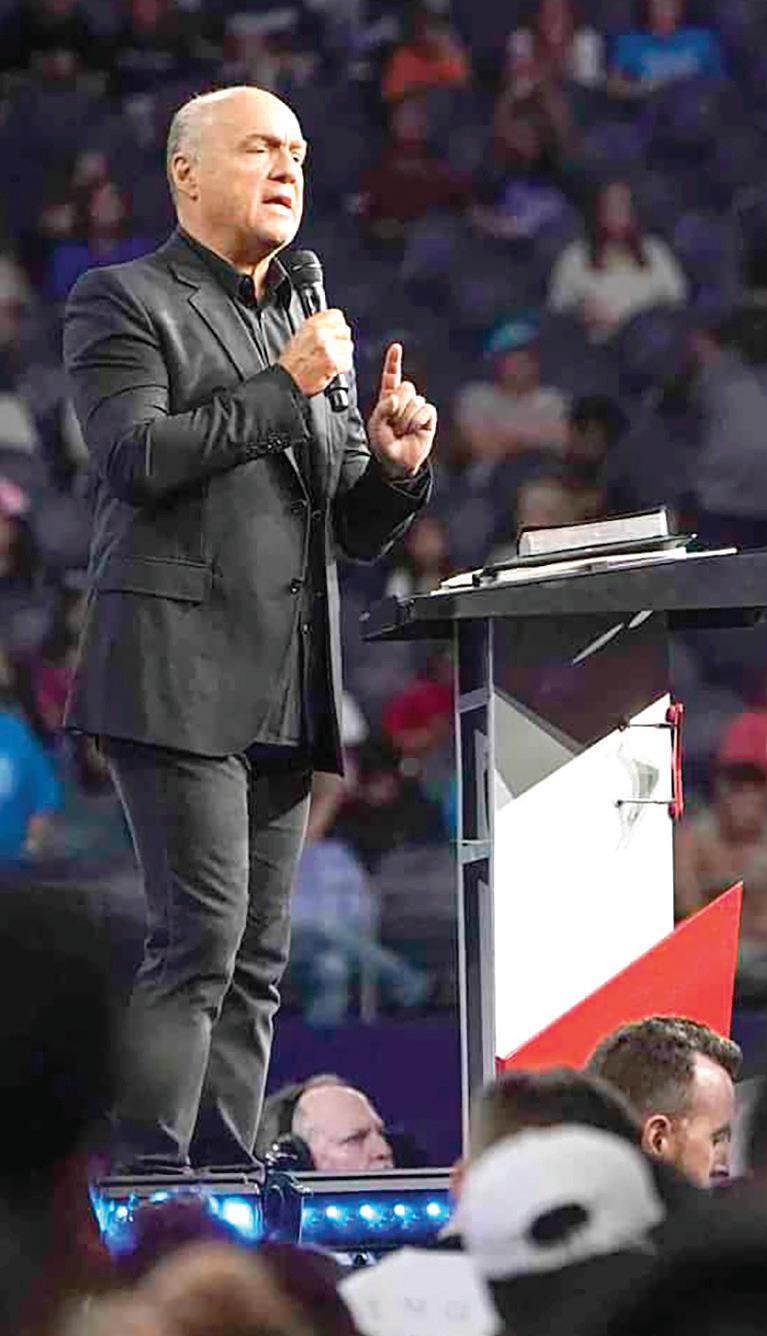
Jesus himself taught us we’re the salt, we’re the preservative of the culture. If the culture’s rotten, we don’t get to point over there and say, “Look how rotten the culture is.” We have to look at us and how un-salty we are.
IB: Robby Gallaty is talking about immediate response to the gospel and immediate call to baptism at a time when so many of our churches are going away from altar calls.

Harris: When Robby shares how God really transformed him, it was first an encounter. In the early days of the pandemic, he was in prayer every morning on his deck. And God said, “Well, you know, here’s what I said in my word (about baptism), and here’s what’s preventing me from doing it.”


Robby was so broken that he said, “Okay, God, I’m gonna honor you.”
He sent out an email to his deacons, his leaders, his staff, and said, “I want the tanks filled. I want towels. I want t-shirts. I think I’ve heard from God; we’re gonna do this.” And that Sunday they did it. He called people to repentance and to be baptized immediately. And they baptized in every service.
That was the floodgate that started that whole movement. What we’re seeing in my opinion is the impact of one pastor being broken that we’re not being obedient to the biblical text— gospel sharing and calling for immediate decisions.
IB: You’ve described ‘pockets’ where the Spirit is at work. Are you seeing this in Illinois?

Harris: We’re seeing pockets of it. I could tell you about churches in Wayne City and Centralia where pastors are seeing baptisms again. I’m working with churches across Illinois that are focusing on evangelism and the role of prayer.



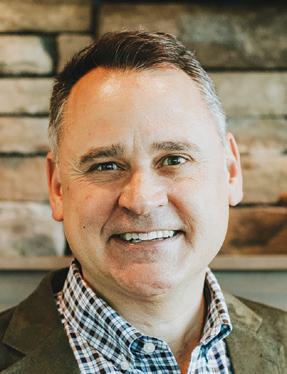
At Alpha Baptist Church in Bolingbrook, Pastor Bruce Kirk is trying to reach men, because he said in their cultural context the men are missing. He’s asked the church to give names of lost people. And they go up with markers and write down names. They’re praying as a church. Every Sunday he brings the men on stage. He prays over them, he’s leading them to pray for their friends.
Those are just a few examples. I believe we can see so much more as the Spirit moves supernaturally to revive the church and awaken lost people in Illinois.
A regional two-day event to help encourage, inspire, and instruct you to effectively share your faith. Help your church reach lost friends, family members, and people in your community for Christ.
Marion Sept. 11-12
Featured speakers
Wheaton Sept. 18-19
Decatur Sept. 25-26
Each attendee will receive free resources!


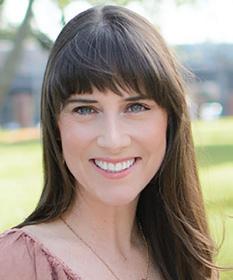




 BY ERIC REED
BY ERIC REED
O’Fallon | Donn and Joni Schaefer had organized mission trips to Russia ten times since 2008. They taught English in Siberia as a way to open discussions about the gospel. But when the invasion of Ukraine shut down trips into Russia for Americans, the Schaefers looked for other avenues to use their unique skills.
The Illinois couple turned their focus a little west, to Ukranian refugees flooding into Poland.
“English is always a draw wherever you go,” Joni said, “because it’s the language of commerce and of travel.” And for a mission team of nine from First Baptist Church of O’Fallon, it was the language of love—three classes per day.

“Things never turn out on a mission trip
said. In this case, the schedule was busier than ever, with classes for Ukrainian refugees in the morning, Polish adults in the evening after work, and a Bible club much like Vacation Bible School for children in the afternoon. “We used to take six months to prepare the team; this time we had eight weeks.”
The Schaefers scouted out the trip a month before their July 15-26 expedition. “Leading mission trips to Siberia gave us an edge,” Donn said, “because we knew how to teach English to people who speak Russian.” The Belleville residents had a proven curriculum that Donn thought would adapt well to other Slavic languages, but the effect of the war was another matter.

“In our little world in Illinois, the war had affected us because it shut off ever seeing the Russian people again,” Joni said. “We had to go through a grieving process.”
This experience helped prepare the couple to embrace refugees. Donn contacted Mark McCor mick, a counselor from Illinois’ Baptist Children’s Home and Family Services, to offer guidance for their new field. “I wanted to make sure we knew how to deal with women and children who were experiencing trauma,” Donn said.
“He said the men should hug the boys, which may sound a little strange,” Joni said, “because their fathers are still back in Ukraine—”
“Or, dead,” Donn interjected.
“So the kids just hang onto you.”
International connections
Back home in Illinois, members of FBC O’Fallon prayed for the team day by day. Using a novel method they used once before, the team created and distributed paper chains with prayer requests, one per day, featuring the team members and their photographs. Each day, one prayer link was removed and that person prayed over.

“We mixed up the links, so everyone was prayed for every day,” Joni said.
The last link included instructions to text the team as they returned home. “We knew the church was praying for us,” Joni said. “We’ve asked people to pray for us before, and they say, ‘OK, we will, but we don’t know what to pray for.’ This way the church has specific prayer requests.”
Commitment to missions, and to mission trips, is characteristic of this congregation. And so is a commitment to Poland. “My first international mission trip was to Poland just before I came to FBC O’Fallon,” Pastor Doug Munton said. “In fact, it was there that God confirmed for me that I was to come to FBCO. That trip was life changing for me as I saw God’s work in the world in a larger way than ever before.”
Munton has served the church 27 years and engaged in multiple mission trips. “It also caused me to desire to see FBCO become deeply involved in missions around the world,” he said. “We have had long term partnerships in Uganda, Cuba and another country.”
READY, SET, TEACH – After ten trips to Russia before the war, Donn and Joni Schaefer (left) organized their first mission to Poland. With them were (continuing l-r) Marilyn Dawson, Patrick Austin, Karen Dunn, David Chumley, Sterling Dare, Zach England, and Melissa Witt-Smith
The connection to Poland extends beyond Munton and this recent mission team.



“The IMB missionaries that we worked with in this recent trip to Poland, Chuck and Vikki Franks, have family in our church. They have been to FBCO many times over the years. When it became impossible for us to go back to a particular country, we got connected with the Franks and God opened doors for us to go,” Munton said. “Willingness met need and opportunity.”
The missionaries in Ilawa had wanted to employ English classes as witnessing opportunities for 13 years, Donn said. They reported after the team returned home that they will start a family English class in January. Of their work over a week in central Poland, Donn said, “It looks very chaotic, but it’s amazing to see what happens.”
The three-a-day classes culminated in “Party Day.” In this situation, with both Poles and refugees from Ukraine in their sessions, the team brought them all together. That produced an unusual gospel presentation. Donn shared his testimony in English, which an IMB missionary translated into Polish, and a bi-lingual person from Ukraine translated into their language.
“There is something powerful and life changing about a mission trip,” Munton said. That applies to the people hearing the gospel, the team members, and the church at home.
In addition to the mission team’s work, Joni
credited Send Relief for life-sustaining work among refugees. “Send Relief has been doing amazing things for Ukraine,” she said. The joint venture of the International Mission Board and the North American Mission Board has become a rapid response agent in times of crisis, even abroad.
“One missionary we worked with received an email asking what they needed” soon after the flight of refugees into Poland began, Joni said. He thought it might take months and “a bunch of red tape.” But a 72-word request produced funds in six hours to help refugees immediately with food and housing, and support ongoing work to convert an office complex into living quarters.
“Southern Baptists need to know this,” she said. “The missionaries just can’t say enough good things about Send Relief.”
And for Pastor Munton, “I would love for every IBSA pastor and church to consider a personal connection to international missions. Maybe churches could consider sending their pastor or a team on a trip as well as supporting our career missionaries through prayer and finances.”
That includes Cooperative Program and the Lottie Moon Christmas Offering for International Missions. “It can change how they see evangelism and discipleship both globally and locally,” Munton said.

As it has for the Schaefers and their mission teams who are characteristically humble about their work. As Donn said, “We’re just normal people who go on mission trips.”
PERSONAL CARE – The church prepared special “pampering” kits for Ukrainian women, including all types of personal items. The IMB missionaries in Ilawa passed some along to a Ukrainian pastor. He is starting a church nearby and was holding a special camp for children. “We were glad to share them with him as he hasn’t had a lot of outside help,” the missionary said.
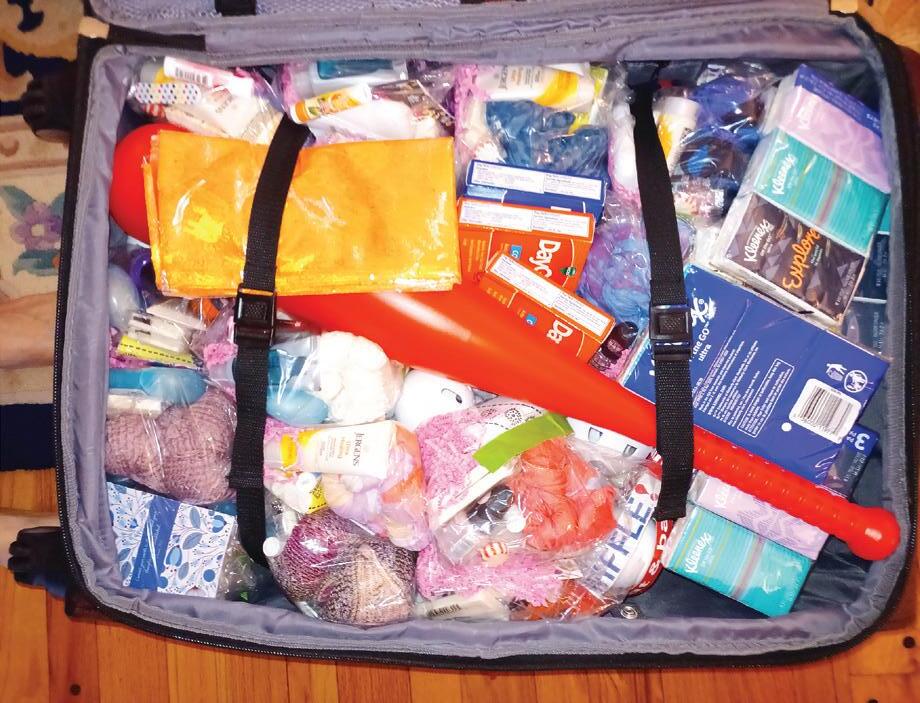

This book and his FILO podcast are geared specifically towards church production leadership and spirituality. It tackles the hard questions head on and has changed how I view production and leading others to glorify God. The book is complete with discussion questions at the end of each chapter making it great for personal growth or engaging your team.
– Alex Crain Production Director, Cornerstone, Marion

I have read this book twice and it is on my list to read again. Kay defines joy as “the settled assurance that God is in control of all the details of my life, the quiet confidence that ultimately everything is going to be all right...” Kay shares some of her own tough circumstances, but she shows we can choose joy because of the hope we have in Christ. “Our thinking changes first, our actions come next, and our feelings follow.” So many times, we try and do this backwards and rely on our feelings first. This book truly changed my outlook on life.
– Barb Troeger Pastor’s wife, FBC Riverton, IBSA Executive Administrative AssistantCorrection: In our previous issue, Chris Merritt recommended Engaging Generation Z: Raising the Bar in Youth Ministry by Tim McKnight. Chris is Pastor of Business Administration for Tabernacle Baptist Church in Decatur. We accidentally included the wrong photo with his review. Here’s what he really looks like. Thanks for your grace, Chris.
I’ve had the conversation many times. Sometimes it’s with the person who says, “I think I’m gay.” Sometimes it’s with their friend or their parents. In our culture today, discussions about sexual identity are commonplace. It’s not only in large metropolitan areas. It’s here, it’s more public, and it’s growing among teens and young adults.
For pastors I say the first thing to do is be ready for the conversation. Second, create an environment at your church where it’s OK for people to ask hard questions—for themselves or for someone they love.
For me, the conversation often starts with, “It’s a good thing that this discussion has begun. I understand how unnerving this is for you. But do not hope it will just go away. Do not allow your fear to silence the conversation.”
Parents especially need hope and guidance. They are especially prone to running from the conversation, so I try to bring peace first, then help them become more comfortable talking about their child’s sexuality.
Next, we get clear on the terms being used. I ask, “What do you mean when you say you’ve come to know you (or they) are gay?”
It’s imperative early in the discussion to separate same-sex attraction from homosexual action. Attraction is not sin, but acting on that attraction is. By
saying this, I acknowledge their feelings. I let them know from a pastoral perspective that they are being heard. I am not dismissing their experience, but I am not condoning homosexual activity. Clarification of terms is important because it’s the identity issue that clouds the discussion. When a person says, “I am gay,” they are making a statement of identity. “I was born with same-sex attraction” is profoundly different from “I have no choice but to be true to (act on) my homosexual identity.” Many jump from the first statement to the second, not realizing they’ve skipped several steps. Mistaken identity thrusts them toward becoming a part of the LGBTQ identity and a cultural movement.
More and more, our pastoral staff deals with sexual identity issues. That’s because of the proliferation of the sexuality movement, and because we have made it safe to talk about the hard stuff of life. Guests know it even before they enter the building.
There are two signs beside our front doors. You’ll see the text if you visit our website. In short, one says everyone is welcome here no matter how they describe themselves. The list is funny (soccer moms and NASCAR dads, latte-sippers and nose-pickers) but also very serious (single or married, gay or straight). The other sign says
whatever our spiritual condition on arrival, God loves us too much to leave us that way.
It’s a challenge for pastors to make everyone welcome, but to meet them with biblical truth. A consultant who was working with us on a project commented on the signs. “A lot of churches say it, but you really mean it,” he told me. Then he described a man he saw in our men’s room who was wearing heels and what looked like a woman’s dress.
“Oh, that’s George*,” I said. “He’s one of our regular attenders. We continue to love him and keep having conversations about the clothes he wears. His reasons for wearing a dress keep changing. He usually gets upset when we ask to meet with him. But he listens, adjusts, and keeps coming back. We keep walking with him even though it is often two steps forward and one step back.”
Pastoring through today’s sexuality issues gets complicated fast; it gets sticky. And you can expect it be an ongoing work. If we put up a sign, we have to mean it. We do not affirm sin. We help people follow Jesus, and that includes helping people discover what is broken or distorted.
Our ministry team will pastor a person experiencing same-sex attraction as we would someone who is struggling with anxiety or pornography or any other struggle. I preach on all types of issues we face, and sexuality comes up several times each year. I tell our people, “We will walk with you through anything and for as long as it takes, as long as you genuinely desire to follow Jesus.”
Resources I recommend Holy Sexuality and the Gospel by Christopher Yuan (Multnomah, 2018)
Is God Anti-Gay? by Sam Allberry (Good Book Co., 2013)
“I’m not so sure you ‘grew up in church.’”

Michael Nave is lead pastor of Cornerstone Church in Marion. He is the elected vice president of IBSA.
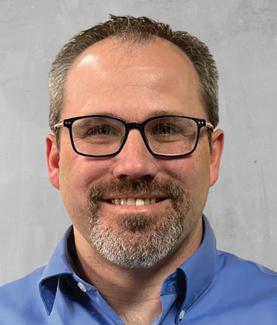
Voters in a Michigan town turned down taxes to fund the library over objection to explicit LGBTQ content on its shelves. The Patmos library in Jamestown will lose 84% of its budget and may be forced to close. A parents group led opposition to a Pride Month display of gay novels which were accessible to children. The library moved a few books behind the counter, but refused to remove them completely. The director cited First Amendment rights.
A pharmacist who is also a pastor did not violate a woman’s rights when he refused to fill a prescription for “emergency contraception” because of his religious beliefs. A Minnesota jury sided with George Badeaux of McGregor, but they awarded the woman $25,000 for emotional harm. She had to drive three hours round trip to another drug store to have the prescription filled. The pastor’s attorney said it is unlikely he will be required to pay the penalty because he did not intend to discriminate against the woman.
Indiana’s governor signed a bill almost completely outlawing abortion Aug. 5, then on the same day signed another bill to help pregnant women and families with young children. The “Hoosier Family First” act sets aside $45 million to ease financial burdens which are often cited as a reason for terminating pregnancies.
“While there is still more to do, better access and awareness of all our programs will be critical to improving our infant and maternal mortality rates,” Gov. Eric Holcomb said. The legislation comes six weeks after the U.S. Supreme Court overturned Roe v. Wade and returned abortion regulation to the states’ discretion.
Voters turned aside the “Value Them Both” legislation which would have protected unborn babies and their mothers. By about 60%, Kansas voters in the Aug. 2 election did not approve legislation that would have amended the state constitution so that it “does not require government funding of abortion and does not create a right to abortion.” Pro-life supporters who were “hugely disappointed” said opponents turned out in mass, while their side stayed home.
– Excerpted from Christian Post
The clock slows as the Justice Department investigates the SBC
One of Mr. Rogers’s songs comes to mind: “Something to do While We’re Waiting.”
The announcement that the Department of Justice is investigating the Southern Baptist Convention came with no reference to a timetable. It was the SBC Executive Committee that said DOJ had subpoenaed records pertaining to their handling of sexual abuse allegations. DOJ itself would not confirm the report. The few comments from people experienced in such probes said, in effect, we’ll know something when we know something. And not until.
DOJ doesn’t announce its schedule. Speculation is futile. So what shall we do in the meantime?
We will wonder why the federal investigation came at almost the same time as the FBI’s search and seizure mission at former President Donald Trump’s Mar-A-Lago resort in Palm Beach. Some pundits have commented on the coincidence between an Aug. 5 raid at Mar-ALago and an SBC probe announced Aug. 12. We can hope that’s not how the Justice Department operates.
We will wonder whether a federal probe will lead to similar investigations by state attorneys general. One lawyer for abuse survivors quoted in our earlier coverage said federal findings could feed state investigations. In May SNAP (Survivors Network of those Abused by Priests) called on state attorneys general to open investigations of Southern Baptist entities. And a Missouri publication (not connected to the Missouri Baptist Convention) followed suit. So far, there are no reports of state-led investigations.
And we may wonder about the specific nature of the investigation—namely the names. Who is on DOJ’s list? We don’t know. The people mostly involved with the handling of abuse claims and failure to make public a list of offenders that was secretly held are gone from the EC. There’s mostly a new crew operating the SBC’s central business hub in Nashville.
“Follow the money” is a technique sometimes applied in such investigations. While there may be speculation on social media, there has been no indication of a financial cover-up at the denominational level. The only payments we know of were authorized very publicly by messengers for the Guidepost Solutions investigation that the SBC Sexual Abuse Task Force itself contracted. The government investigations of televangelists in the 1980s that involved hush money were for very different actions and in very different organizations.
Send NetworkiNg items to IllinoisBaptist@IBSA.org
Crossroads Community Church in Brighton seeks pastor. If you are prayerfully led by God to learn more about Crossroads, Brighton, and this opportunity, email resumé to vbates@brightoncrossroads.org.
Plainville Baptist Church seeks bivocational pastor Send inquiries to Allen Flynn, allen.1968@yahoo.com or call (217) 242-9182.
We will pray for the current SBC leadership. It should be said that Interim EC President and CEO Willie McLaurin stepped in at a very difficult time. With the elected officers and team currently in place, the EC leaders have bravely taken responsibly to right the ship. We can only imagine the pressure they face daily. They need our prayer. So do all SBC entities, mission boards, seminaries, auxiliary, their heads, and the boards of trustees who bear spiritual and legal responsibility for their actions.
We can pray for future leaders. Search teams are at work for the top leadership positions of both the Executive Committee and the Ethics and Religious Liberty Commission. As with any pastor search, this is a spiritual battle. With these selections, the future of our global mission is at stake.
We can pray for restored confidence in the pews. Funding for missions depends on faithful giving by Baptists every Sunday at offering time. After a post-Covid rebound, the Cooperative Program has taken a dip midyear. Whether that was connected to any of the convention politics or previous abuse-handling investigation would be pure speculation. It could be connected to inflation. Whatever the case, our churches can still give in the confidence that SBC offerings fund the spread of the gospel worldwide. Our missionaries still need our support from here at home.
When people ask us specifics about the federal investigation, “no comment” is an insufficient response; it sounds dodgy. “I don’t know” is probably more accurate. The best answer may come from the biographies of W.A. Criswell: “We’ll wait and see what the Lord does.”
And we can pray for a clean bill of health. As former IBSA president and current EC trustee Adron Robinson said, God is a God of righteousness. This investigation may be another way for God to display his righteousness, and for his people to demonstrate their commitment to truth and justice, Christlike ministry to survivors, and careful protection of children and vulnerable adults.
As Pastor Robinson said, we’re not afraid of the truth.
So, what shall we do in the meantime?
“Wait for the Lord; be strong, and let your heart take courage; wait for the Lord!” (Ps. 27:14)
And give DOJ the documents they ask for.
Eric Reed is editor of Illinois Baptist media.
Freedom Baptist Church in Noble seeks bivocational pastor. Salary commensurate with employment hours. Send resumé to Tony Prosser, 2665 E. Calhoun Ln, Olney, IL 62450 or tkprosser88@gmail.com.
New Life Baptist Church of Waverly seeks bivocational pastor. Submit resumé to 341 East Elm, Waverly, IL 62692. Contact Gloria Henning for more information at (217) 414-5849.
Steeleville Baptist Church seeks full-time senior pastor. Learn more at steelevillebaptist.com. Send inquiries 1315 West Shawneetown Trail, Steeleville IL 62288, or steelevillebaptistsearch@gmail.com.
David Higgs is the new associate pastor of worship at Lincoln Ave. Baptist Church in Jacksonville. Higgs was the worship pastor at Dorrisville Baptist Church in Harrisburg for the past 15 years. He also served churches in his home state of Mississippi, Texas, and Alabama over 20 years in ministry. Higgs graduated from Delta State University and studied at Southwestern Baptist Theological Seminary. He is married to Connie and they have two adult children.
Kirk Kay became Lead Pastor at Immanuel Baptist, Benton in August. He previously served churches in Texas, Mississippi, and Kentucky. He was a Chaplain in the U. S. Army seven years. Kay holds a B.S. from Mary Hardin-Baylor, an M.Div. from Mid-America, and a D. Min. from Talbot Seminary at Biola. He is married to Brandi and they three children.



Theodore Siu began as Assistant Pastor at Immanuel Baptist, Chicago July 1. A graduate of Moody Bible Institute, Siu earned his Master of Divinity from Trinity International University as well as a Certificate of Preaching from the Chicago Course on Preaching. Prior to his current position, Theo served at Immanuel as a Pastoral Apprentice and then was ordained as a lay elder in March 2020.

Charles Wilson is the new pastor of FBC Golconda. Originally from West Frankfort, he suffered a medical situation that required brain surgery to repair the injury and save his life twelve years ago. Wilson is ready to take on ministry after that journey, he said. A graduate of Liberty University, Wilson is married to Deborah and a proud parent and grandparent.
SHARE YOUR NEWS. Send us info on the comings and goings, ordinations and promotions at your church. Illinoisbaptist@IBSA.org
A Celebration of Life service was held Aug. 10 for former newspaper editor Michael Leathers. He died of a heart attack Aug. 3 at age 61.
Leathers served as editor Illinois Baptist 1999-2002, and was more recently a media and public relations consultant for Memorial Health Systems. He was a native of Mt. Vernon and a graduate of Judson College. Leathers is survived by his wife, Tammy, one son, his mother, and three siblings.

Virginia Mae Harris, 86, died July 13 at her home in Carrollton. She was preceded in death by her husband, Ervin, in 2012. She was a faithful pastor’s wife in their ministry to churches in Illinois, Missouri, and Tennessee across 54 years. She served as a bookkeeper in metro St. Louis for 30 years. At the time of her death, she was a member of Lincoln Ave. Baptist Church in Jacksonville and was active in the ladies’ sewing ministry. Harris is survived by three children, six grandchildren, and six great-grandchildren.
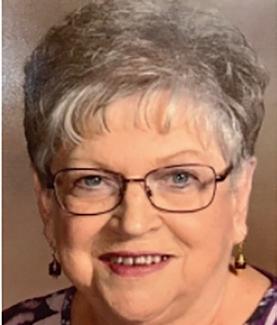
Voter Guides will be available in late September. You can pre-order them in bulk now so you’ll be the first to get them.
These non-partisan voter guides meet IRS guidelines for churches to distribute. They reveal where candidates stand on a number of issues that are of importance to voters. Order them in any amount to distribute in your church, neighbors and friends.



CONTACT US: v.kathy@illinoisfamily.org or call 708-781-9328 illinoisfamily.org

Churches face legal issues all the time, so they need to be prepared. And when an issue arises, churches need trusted counsel.
With over 24 years of service, at all court levels, Alliance Defending Freedom (ADF) has seen the cultural and legal trends clearly shift against the Church.

We can help your church prepare itself for these changes.
Enter code IBSA20 to receive a reduced annual membership of $200, which is 20% off the regular price.
When: 9/13 Mt. Vernon; 9/17 Springfield; 9/20 Plainfield; 9/27 Sterling; 10/4 Clear Creek Assoc.; 10/11 Williamson Assoc.; 10/11 Morton Info: IBSA.org/equiponline
September 9-10
Where: Tabernacle, Decatur
Contact: (217) 877-5653
October 9
Youth Encounter
Where: Tabernacle, Decatur and Cornerstone, Marion
When: 3-9 p.m.
Cost: $35 ea. plus $11 T-shirt Info: IBSA.org/youth-encounter/
October 21-22
Where: Lake Sallateeska Baptist Camp Info: IBSA.org/dr
October 29

Illinois Kids Ministry Conference
Where: IBSA building, Springfield Info: TammyButler@IBSA.org
Nov. 1-2 • IBSA Pastors Conference
Nov. 2-3 • IBSA Annual Meeting
Where: Metro Community Church, Edwardsville Info: IBSAAnnualMeeting.org
November 4-5
AWSOM Conference for teen girls
Where: Tabernacle, Decatur Info: IBSA.org/awsom-conference/
November 7-9
IBSA 2022 Streator Experience (Men’s Winter Bible Study)
Where: Streator Baptist Camp
Cost: $100 per person (includes 2 nights lodging, 6 meals, snacks)
Contact: Ric Worshill at chaplain@shomreem.org or Don Evans at pastordon63@gmail.com Info: Facebook.com/StreatorExperience
Iwas horrified at the tears filling my eyes. It was the last day of Vacation Bible School at Chatham Baptist Church and I had stopped on our way out to thank my daughter’s teacher. But what I’d intended as a breezy thank-you turned awkward as I was hit with the full weight of my appreciation for this week and these kind volunteers.
This is not my first rodeo, I thought as I mentally chased back the tears threatening to spill over. I’ve been a part of VBS in one way or another for 30 years. Get it together. I briefly won the battle, but then the tears came back.

Miss Bonnie graciously pretended not to notice, accepted my thanks, and then gave Lucy a big hug before we left. Because her mother is obviously going through some things, I thought as we walked to the car.
Indeed, this wasn’t my first experience with VBS. But it was the first time I’d dropped my children off at 9:00 and picked them up at noon, still singing the songs they’d learned that day. It was the first time our daughters spent a week of mornings dedicated to patient, caring instruction in God’s word; the first time I’d noticed how those mornings can build on one another, resulting into some important conversations at home about God, grace, sin, and salvation.
Some cite COVID, others say we’re all just more aware these days, but the percentage of pastors who know church members with mental health issues is on the rise.
More than half of pastors (54%) say at least one person in a church they served suffered depression, bipolar disorder, or schizophrenia.
Pastors report:
1-5 people
18% 6-20+ people
Unsure
12%
None
36% 34%
26%
of pastors say they personally have struggled with some type of mental illness.
– Lifeway Research
17%
say their condition was diagnosed.
– Lifeway survey of 1,000 Protestant pastors from 2021, reported August 2022
“The church...has ignored it, pretended it doesn’t exist, or worse, acted as though all mental illness was a result of sin. Our obsession with outward perfection has led us down a dark, dangerous path of contempt toward anything that doesn’t measure up to our false definition of what a ‘good Christian’ should look like.”
MEREDITH FLYNN
With some time for reflection, I’ve realized what I was going through that week was experiencing ministry on the flip side. Most of us have years of experience volunteering at VBS, leading Bible studies, and serving as camp counselors. What we may do less often and less easily is availing ourselves to the ministry of the local church, trusting fellow Christians to serve faithfully and obediently, and leaning into Scripture’s call to live in loving community with each other.
It’s been a few weeks, but I am still a full-fledged VBS evangelist. You should definitely sign up next year, I’ve told practical strangers at the library or the grocery store. I’ve made a mental note to mark the date on our 2023 calendar. And I’m still thinking about how I can engage in ministry from the participant side, for opportunities to listen instead of lead.
I’d also like to be less weepy when I witness churches loving their communities well, but I’m not making any promises.
Meredith Day Flynn is a wife and mother of two living in Springfield. She writes on the intersection of faith, family, and current culture.
–Jessica Thompson, How to Help Your Anxious Teen (2019)
6-in-10 pastors preach on mental health issues at least once a year.
68% keep a list of expert referrals
40% have a family support plan
26% provide encouragement training
26% host Celebrate Recovery
23% seminars on depression/anxiety
20% host community groups
18% have a counselor on staff
– John BunyanIf we have not quiet in our minds, outward comfort will do no more for us than a golden slipper on a gouty foot.